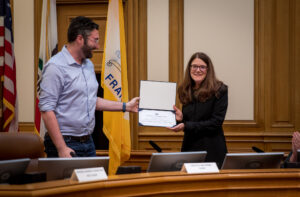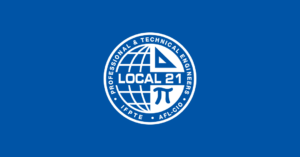 As part of the Tech Hire Agreement, Local 21 negotiated an agreement with the City to create a working group to look at streamlining the existing telecommuting policy. The existing policy is not widely used due to it being overly long and prohibitively restrictive. All participants saw the advantage of improving the telecommuting policy, which when used more widely, will save employees time and money on commuting, allow departments to see improvements in productivity and employee morale, and will reduce the City’s carbon footprint. Retention and recruitment is a particular problem in IT, which is why this working group came out of the Tech Hire Agreement.
As part of the Tech Hire Agreement, Local 21 negotiated an agreement with the City to create a working group to look at streamlining the existing telecommuting policy. The existing policy is not widely used due to it being overly long and prohibitively restrictive. All participants saw the advantage of improving the telecommuting policy, which when used more widely, will save employees time and money on commuting, allow departments to see improvements in productivity and employee morale, and will reduce the City’s carbon footprint. Retention and recruitment is a particular problem in IT, which is why this working group came out of the Tech Hire Agreement.
Local 21 members Teri Dowling, Kim Thompson, Danny Yeung, and San Francisco VP Gus Vallejo joined Local 21 staff at monthly working group meetings with DHR and representatives from major city departments in order to revise the existing telecommuting policy. The outcome was something everyone can be proud of. A policy that was previously 60 pages long has been reduced to 4 pages, and many of the restrictive elements have been removed. For example, the new policy says that managers now need to have a legitimate business reason to deny workers’ telecommuting requests.
Kim Thompson, a Local 21 member from the Department of Technology (DT), was proud to be part of the process. Kim facilitated her department’s work to streamline the guidelines and technical specifications in the new policy. She says that the City’s telecommuting policy is “more flexible, concise, and easier for employees and departments to use.” Kim says she “hopes the new policy will bring more visibility to the benefits of the program.”
Many thanks to the team of Local 21 members who helped create this updated policy on behalf of thousands of City workers.
For more details on the new program, see below.
Telecommuting Policy and Program Update FAQ
- The updated Telecommuting Policy and Program will be ready for implementation starting in early 2017.
- Telecommuting is a win-win-win for employees, departments, and the City. Employees can save time and money on commuting, departments can see improvements in productivity and employee morale, and the City will see a reduction in its carbon footprint.
- Telecommuting benefits statistics (quote Global Workplace Analytics on this data):
- 95% of employers say telecommuting has a high impact on employee retention
- 80% of employees consider telecommuting a job perk
- Every 1% reduction in vehicles yields a three-fold decrease in traffic congestion
- Traffic jams waste almost 3 billion gallons of gas and account for 26 million extra tons of greenhouse gasses
- The City’s Department of the Environment estimated that one telecommuting City employee could reduce 1.5 tons of CO2 and other greenhouse gas emissions per year. That means 4,000 telecommuting employees could save over 6,000 tons of greenhouse gas emissions per year, equaling electricity for 850 homes.
- To be effectively implemented, telecommuting must be a cooperative and mutually beneficial arrangement between an employee and his or her department.
- Telecommuting is a privilege for employees, not a right, and is not grievable by Local 21.
- Departments will determine employee eligibility based on job duties and work habits.
- Telecommuting may be an option for reliable and self-motivated employees whose work is knowledge-based and does not require them to be on site.
- All program materials, including the application form, will be available on the Department of Human Resources website at sfdhr.org/telecommute.





